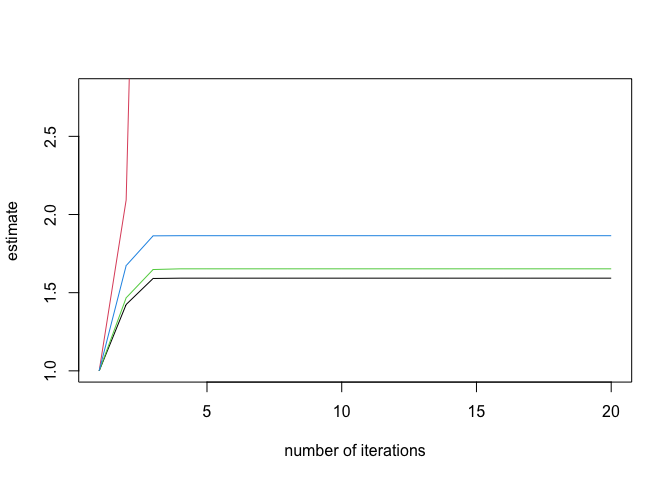Detect and Check for Separation and Infinite Maximum Likelihood Estimates.
detectseparation 
detectseparation provides pre-fit and post-fit methods for the detection of separation and of infinite maximum likelihood estimates in binomial response generalized linear models.
The key methods are detect_separation and check_infinite_estimates.
Installation
You can install the released version of detectseparation from CRAN with:
install.packages("detectseparation")
And the development version from GitHub with:
# install.packages("devtools")
devtools::install_github("ikosmidis/detectseparation")
Detecting and checking for Infinite maximum likelihood estimates
Heinze and Schemper (2002) used a logistic regression model to analyze data from a study on endometrial cancer (see, Agresti 2015, Section 5.7 or ?endometrial for more details on the data set). Below, we refit the model in Heinze and Schemper (2002) in order to demonstrate the functionality that detectseparation provides.
library("detectseparation")
data("endometrial", package = "detectseparation")
endo_glm <- glm(HG ~ NV + PI + EH, family = binomial(), data = endometrial)
theta_mle <- coef(endo_glm)
summary(endo_glm)
#>
#> Call:
#> glm(formula = HG ~ NV + PI + EH, family = binomial(), data = endometrial)
#>
#> Deviance Residuals:
#> Min 1Q Median 3Q Max
#> -1.50137 -0.64108 -0.29432 0.00016 2.72777
#>
#> Coefficients:
#> Estimate Std. Error z value Pr(>|z|)
#> (Intercept) 4.30452 1.63730 2.629 0.008563 **
#> NV 18.18556 1715.75089 0.011 0.991543
#> PI -0.04218 0.04433 -0.952 0.341333
#> EH -2.90261 0.84555 -3.433 0.000597 ***
#> ---
#> Signif. codes: 0 '***' 0.001 '**' 0.01 '*' 0.05 '.' 0.1 ' ' 1
#>
#> (Dispersion parameter for binomial family taken to be 1)
#>
#> Null deviance: 104.903 on 78 degrees of freedom
#> Residual deviance: 55.393 on 75 degrees of freedom
#> AIC: 63.393
#>
#> Number of Fisher Scoring iterations: 17
The maximum likelihood (ML) estimate of the parameter for NV is actually infinite. The reported, apparently finite value is merely due to false convergence of the iterative estimation procedure. The same is true for the estimated standard error, and, hence the value r round(coef(summary(endo_glm))["NV", "z value"], 3) for the z-statistic cannot be trusted for inference on the size of the effect for NV.
detect_separation
detect_separation is pre-fit method, in the sense that it does not need to estimate the model to detect separation and/or identify infinite estimates. For example
endo_sep <- glm(HG ~ NV + PI + EH, data = endometrial,
family = binomial("logit"),
method = "detect_separation")
endo_sep
#> Implementation: ROI | Solver: lpsolve
#> Separation: TRUE
#> Existence of maximum likelihood estimates
#> (Intercept) NV PI EH
#> 0 Inf 0 0
#> 0: finite value, Inf: infinity, -Inf: -infinity
So, the actual maximum likelihood estimates are
coef(endo_glm) + coef(endo_sep)
#> (Intercept) NV PI EH
#> 4.3045178 Inf -0.0421834 -2.9026056
and the estimated standard errors are
coef(summary(endo_glm))[, "Std. Error"] + abs(coef(endo_sep))
#> (Intercept) NV PI EH
#> 1.63729861 Inf 0.04433196 0.84555156
check_infinite_estimates
Lesaffre and Albert (1989, Section 4) describe a procedure that can hint on the occurrence of infinite estimates. In particular, the model is successively refitted, by increasing the maximum number of allowed iteratively re-weighted least squares iterations at east step. The estimated asymptotic standard errors from each step are, then, divided to the corresponding ones from the first fit. If the sequence of ratios diverges, then the maximum likelihood estimate of the corresponding parameter is minus or plus infinity. The following code chunk applies this process to endo_glm.
(inf_check <- check_infinite_estimates(endo_glm))
#> (Intercept) NV PI EH
#> [1,] 1.000000 1.000000e+00 1.000000 1.000000
#> [2,] 1.424352 2.092407e+00 1.466885 1.672979
#> [3,] 1.590802 8.822303e+00 1.648003 1.863563
#> [4,] 1.592818 6.494231e+01 1.652508 1.864476
#> [5,] 1.592855 7.911035e+02 1.652591 1.864492
#> [6,] 1.592855 1.588973e+04 1.652592 1.864493
#> [7,] 1.592855 5.298760e+05 1.652592 1.864493
#> [8,] 1.592855 2.332822e+07 1.652592 1.864493
#> [9,] 1.592855 2.332822e+07 1.652592 1.864493
#> [10,] 1.592855 2.332822e+07 1.652592 1.864493
#> [11,] 1.592855 2.332822e+07 1.652592 1.864493
#> [12,] 1.592855 2.332822e+07 1.652592 1.864493
#> [13,] 1.592855 2.332822e+07 1.652592 1.864493
#> [14,] 1.592855 2.332822e+07 1.652592 1.864493
#> [15,] 1.592855 2.332822e+07 1.652592 1.864493
#> [16,] 1.592855 2.332822e+07 1.652592 1.864493
#> [17,] 1.592855 2.332822e+07 1.652592 1.864493
#> [18,] 1.592855 2.332822e+07 1.652592 1.864493
#> [19,] 1.592855 2.332822e+07 1.652592 1.864493
#> [20,] 1.592855 2.332822e+07 1.652592 1.864493
#> attr(,"class")
#> [1] "inf_check"
plot(inf_check)

References
Agresti, A. 2015. Foundations of Linear and Generalized Linear Models. Wiley Series in Probability and Statistics. Wiley.
Heinze, G., and M. Schemper. 2002. “A Solution to the Problem of Separation in Logistic Regression.” Statistics in Medicine 21: 2409–19.
Lesaffre, E., and A. Albert. 1989. “Partial Separation in Logistic Discrimination.” Journal of the Royal Statistical Society. Series B (Methodological) 51 (1): 109–16. https://www.jstor.org/stable/2345845.
